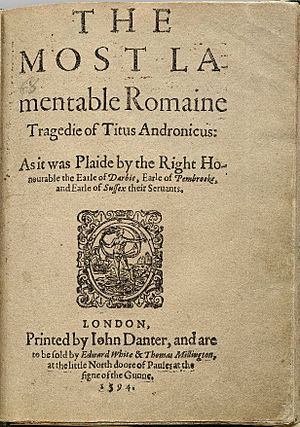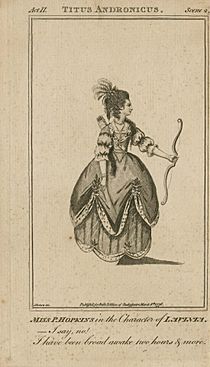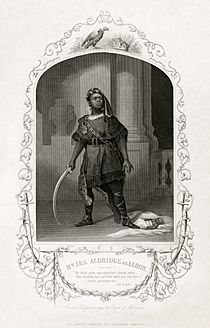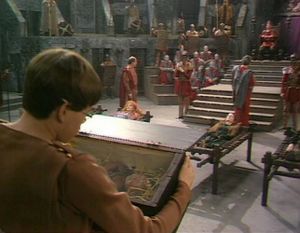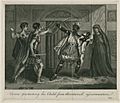Titus Andronicus facts for kids
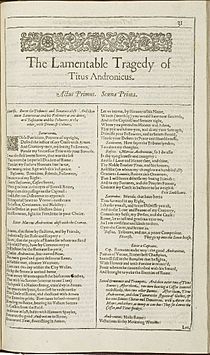
Titus Andronicus is a tragedy by William Shakespeare believed to have been written between 1588 and 1593. It is thought to be Shakespeare's first tragedy.
Titus, a general in the Roman army, presents Tamora, Queen of the Goths, as a slave to the new Roman emperor, Saturninus. Saturninus takes her as his wife. From this position, Tamora vows revenge against Titus for killing her son. Titus and his family retaliate, leading to a cycle of violence.
Titus Andronicus was initially very popular, but by the later 17th century it was not well esteemed. The Victorian era disapproved of it. Its reputation began to improve around the middle of the 20th century, but it is still one of Shakespeare's least respected plays.
Contents
Characters
- Titus Andronicus – renowned Roman general
- Lucius – Titus's eldest living son
- Quintus – Titus's son
- Martius – Titus's son
- Mutius – Titus's son
- Young Lucius – Lucius's son and Titus's grandson
- Lavinia – Titus's daughter
- Marcus Andronicus – Titus's brother and tribune to the people of Rome
- Publius – Marcus's son
- Saturninus – Son of the late Emperor of Rome; afterwards declared Emperor
- Bassianus – Saturninus's brother; in love with Lavinia
- Sempronius, Caius and Valentine – Titus's kinsmen
- Æmilius – Roman noble
- Tamora – Queen of the Goths; afterwards Empress of Rome
- Demetrius – Tamora's son
- Chiron – Tamora's son
- Alarbus – Tamora's son (non-speaking role)
- Aaron – a Moor; involved in a romantic relationship with Tamora
- Nurse
- Clown
- Messenger
- Roman Captain
- First Goth
- Second Goth
- Senators, Tribunes, Soldiers, Plebeians, Goths etc.
Setting
The story of Titus Andronicus is fictional, not historical, unlike Shakespeare's other Roman plays, Julius Caesar, Antony and Cleopatra, and Coriolanus, all of which are based on real historical events and people (or, in the case of Coriolanus, presumed to have been at the time). Even the time in which Titus is set may not be based on a real historical period. According to the prose version of the play (see below), the events are "set in the time of Theodosius", who ruled from 379 to 395.
Adaptations
Plays
The first known adaptation of the play originated in the later years of the sixteenth century.
The earliest English language adaptation was in 1678 at Drury Lane, by Edward Ravenscroft. The play was a huge success and was revived in 1686, and published the following year. It was revived again in 1704 and 1717. The 1717 revival was especially successful, starring John Mills as Titus, Mrs. Giffard as Tamora, James Quin as Aaron, and John Thurmond as Saturninus. The play was revived again in 1718 and 1719 (with John Bickerstaff as Aaron) and 1721 (with Thomas Walker in the role). Quin had left Drury Lane in 1718 and gone to Lincoln's Inn Fields, which was owned by John Rich. Rich's actors had little Shakespearean experience, and Quin was soon advertised as the main attraction. In 1718, the adaptation was presented twice at Lincoln, both times with Quin as Aaron. In the 1720–1721 season, the play earned £81 with three performances. Quin became synonymous with the role of Aaron, and in 1724 he chose the adaptation as the play to be performed at his benefit.
In January and February 1839 an adaptation written and directed by and also starring Nathaniel Bannister was performed for four nights at the Walnut Street Theatre in Philadelphia. The playbill had a note reading "The manager, in announcing this play, adapted by N. H. Bannister from the language of Shakespeare alone, assures the public that every expression calculated to offend the ear, has been studiously avoided, and the play is presented for their decision with full confidence that it will merit approbation." In his History of the Philadelphia Stage, Volume IV (1878), Charles Durang wrote, "Bannister ably preserved the beauties of its poetry, the intensity of its incidents, and excluded the horrors with infinite skill, yet preserved all the interest of the drama." Nothing else is known about this production.
The most successful adaptation of the play in Britain premiered in 1850, written by Ira Aldridge and C. A. Somerset. After the initial performances, Aldridge kept the play in the repertoire, and it was extremely successful at the box office and continued to be staged in England, Ireland, Scotland and Wales until at least 1857, when it received a glowing review from The Sunday Times on 26 April. It was generally agreed amongst reviewers of the period that the Aldridge/Somerset rewrite was considerably superior to Shakespeare's original.
In 1957 the Old Vic staged a heavily edited ninety-minute performance as part of a double bill with an edited version of The Comedy of Errors. Directed by Walter Hudd, both plays were performed by the same company of actors, with Derek Godfrey as Titus, Barbara Jefford as Tamora, Margaret Whiting as Lavinia and Robert Helpmann as Saturninus. Performed in the manner of a traditional Elizabethan production, the play received mixed reviews.
In 2008, Müller's Anatomie Titus was translated into English by Julian Hammond and performed at the Cremorne Theatre in Brisbane, the Canberra Theatre, the Playhouse in the Sydney Opera House and the Malthouse Theatre, Melbourne by the Bell Shakespeare Company and the Queensland Theatre Company. Directed by Michael Gow and with an all-male cast, it starred John Bell as Titus, Peter Cook as Tamora, Timothy Walter as Aaron and Thomas Campbell as Lavinia.
In 2012, as part of the Globe to Globe Festival at Shakespeare's Globe, the play was performed under the title Titus 2.0. Directed by Tang Shu-wing, it starred Andy Ng Wai-shek as Titus, Ivy Pang Ngan-ling as Tamora, Chu Pak-hong as Aaron and Lai Yuk-ching as Lavinia. Performed entirely in Cantonese, from an original script by Cancer Chong, the play had originally been staged in Hong Kong in 2009. The production received excellent reviews, both in its original Hong Kong incarnation, and when restaged at the Globe.
Musicals
Titus Andronicus: The Musical!, written by Brian Colonna, Erik Edborg, Hannah Duggan, Erin Rollman, Evan Weissman, Matt Petraglia, and Samantha Schmitz, was staged by the Buntport Theater Company in Denver, Colorado four times between 2002 and 2007.
Tragedy! A Musical Comedy, written by Michael Johnson and Mary Davenport was performed at the 2007 New York International Fringe Festival in the Lucille Lortel Theatre. Directed by Johnson, the piece starred Francis Van Wetering as Titus, Alexandra Cirves as Tamora, Roger Casey as Aaron (aka The Evil Black Guy) and Lauren Huyett as Lavinia.
Film
In 1999, Julie Taymor directed an adaptation entitled Titus, starring Anthony Hopkins as Titus, Jessica Lange as Tamora, Harry Lennix as Aaron (reprising his role from Taymor's 1994 theatrical production) and Laura Fraser as Lavinia.
William Shakespeare's Titus Andronicus, directed by Richard Griffin and starring Nigel Gore as Titus, Zoya Pierson as Tamora, Kevin Butler as Aaron and Molly Lloyd as Lavinia, was released direct to video in 2000. Shot on DV in and around Providence, Rhode Island with a budget of $12,000, the film is set in a modern business milieu. Saturninus is a corporate head who has inherited a company from his father, and the Goths feature as contemporary Goths.
In 2017, Titus Andronicus was adapted as The Hungry by director Bornilla Chatterjee set in contemporary New Delhi, India. It stars Naseeruddin Shah as Tathagat Ahuja (representing Titus), Tisca Chopra as Tulsi Joshi (representing Tamora), Neeraj Kabi as Arun Kumar (Aaron) and Sayani Gupta as Loveleen Ahuja (Lavinia).
Television
In 1970, Finnish TV channel Yle TV1 screened an adaptation of the play written and directed by Jukka Sipilä, starring Leo Lastumäki as Titus, Iris-Lilja Lassila as Tamora, Eugene Holman as Aaron and Maija Leino as Lavinia.
In 1985, the BBC produced a version of the play for their BBC Television Shakespeare series. Directed by Jane Howell, the play was the thirty-seventh and final episode of the series and starred Trevor Peacock as Titus, Eileen Atkins as Tamora, Hugh Quarshie as Aaron and Anna Calder-Marshall as Lavinia. The production was one of the most lauded plays of the series and garnered almost universally positive reviews.
Radio
The play has very rarely been staged for radio. In 1923, extracts were broadcast on BBC radio, performed by the Cardiff Station Repertory Company as the second episode of a series of programs showcasing Shakespeare's plays, entitled Shakespeare Night. In 1953, BBC Third Programme aired a 130-minute version of the play, adapted for radio by J. C. Trewin and starring Baliol Holloway as Titus, Sonia Dresdal as Tamora, George Hayes as Aaron and Janette Tregarthen as Lavinia. In 1973, BBC Radio 3 aired an adaptation directed by Martin Jenkins, starring Michael Aldridge as Titus, Barbara Jefford as Tamora, Julian Glover as Aaron and Frances Jeater as Lavinia. In 1986, Austrian radio channel Österreich 1 staged an adaptation by Kurt Klinger, starring Romuald Pekny as Titus, Marion Degler as Tamora, Wolfgang Böck as Aaron and Elisabeth Augustin as Lavinia.
Images for kids
-
Thomas Kirk illustration of Aaron protecting his son from Chiron and Demetrius in Act 4, Scene 2; engraved by J. Hogg (1799)
-
Jean-Michel Moreau illustration of Lucius telling his father the tribunes have left, from Act 3, Scene 1; engraved by N. le Mire (1785)
-
Philip James de Loutherbourg illustration of Quintus trying to help Martius from the hole in Act 2, Scene 3; engraved by 'Hall' (1785)
See also
 In Spanish: Tito Andrónico para niños
In Spanish: Tito Andrónico para niños


